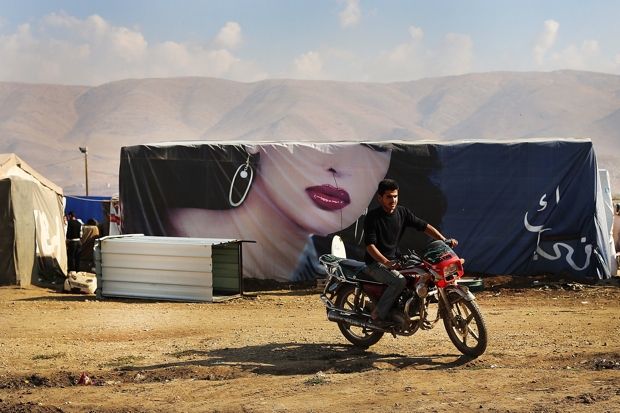It’s Lebanon’s birthday this month — 70 years since independence — but no one’s really in the mood to party. Our first birthday present last week came in the form of two suicide bombers belonging to the Al Qaeda-affiliated Abdullah Azzam Brigades who detonated their payloads at the Iranian embassy in Beirut killing 26 people.
Bombings are nothing new to the Lebanese – after all two presidents, a former prime minister and a handful of MPs have all gone up in smoke in the past 30 years – but this attack underscored the inescapable truth that the country’s chronically feeble institutions are slowly but surely being eroded by the political, social and economic fallout of the Syrian civil war, while covert Sunni support for the Syrian opposition and Hezbollah’s reckless intervention on behalf of the Assad regime, threatens to plunge the country into all out sectarian violence. Lebanon is falling apart
With its wheeler dealer reputation and its ability to party like Pompeii, Lebanon has always flattered to deceive. With a roughly 50-50 Sunni/Shia population and a sizable, if dwindling, Christian community, it can always be relied upon to mirror the tensions in the region. Thus the notion of Lebanese independence – with three decades of Syrian occupation and the pernicious influence of both Saudi Arabia and Iran – has always been something of a non-starter.
As have the Lebanese. Multilingual, highly educated, and in many cases equally cultivated, they shine abroad. At home, with no genuine sense of national identity, they disappear into a vortex of religious madness that can never allow the national good to trump tribal loyalty.
But in 1943 when it was cut loose by its French colonial masters, the tiny former Ottoman province seemed to have it all to play for. Post independence Lebanon thrived and Beirut became a regional refuge for bankers, émigrés, diplomats, spies and traders, acquiring a patina of sophistication along the way.
But patina it was. The Paris of the Middle East was inexorably drawn into the Arab-Israeli conflict. The first blow came in 1966 with the collapse of Intrabank, then the biggest financial institution in the Middle East. Headed by Yusuf Beidas, a brilliant Palestinian financier, the Lebanese establishment ultimately couldn’t stomach a foreigner with half the country in his pocket, so they destroyed him and his bank.
It not only snuffed out any hope Lebanon had of being a global financial player, it set the country on the path to conflict. The former government minister, Najib Alamuddine, saw the Intrabank scandal as “the beginning of the disintegration of Lebanon… [by] a system so corrupt in style and morals that had plagued Lebanon since independence and finally plunged the nation into civil war.”
Three years later Lebanon’s fate was sealed. The Lebanese government, under Arab pressure, signed the Cairo Agreement, which gave Yasser Arafat’s PLO free rein to hit Israeli targets from South Lebanon. It allowed the PLO to form its own statelet and drove a wedge between the Pro-Palestinian Sunnis and Lebanon’s Christians, who felt their country was being sold out and the country drifted into a civil war that eventually suck in Syria, Israel, Russia and the West. Lebanon, it seemed was everybody’s playing field.
A peace of sorts was brokered in 1989. The PLO had gone but in its place was Hezbollah, an Iranian-backed militant party that sold the struggle against Israel’s existential threat as a national duty, one that would also restore the dignity of Lebanon’s Shia underclass. Oh and it also created the world’s strongest non-state army, paid for and run from Tehran.
Despite intermittent spurts of prosperity and optimism, by the time the Syrian conflict erupted in March 2011 Lebanon was a husk. And if the 1975-1990 civil war was about national identity, Lebanon today risks being sucked into a potentially more savage, religious scrap.
And to further muddy the waters of the paranoid Arab mind, Israel is still the bogeyman. In the wake of the recent Beirut blast, Hezbollah warned its political rivals about the dangers of what it believes is an alliance between the Jewish state and the Gulf countries, hoping to swamp the region with Jihadists in the struggle against Iran and its allies.
This handy, if perhaps fanciful, scenario, justified Hezbollah’s Resistance mandate, and has handed Hassan Nasrallah, Hezbollah’s secretary general, the opportunity to reassure a Shia constituency wondering why its brave resistance fighters are killing fellow Arabs just over the border, Bottom line: his party was still on message and would ignore calls from the Lebanon’s opposition to disarm and get out of Syria.
And so Lebanon limps on. There has been no government since April, the economy, the one thing in Lebanon that usually works is in a coma and there are at least 1.5 million Syrian refugees – equivalent to 40% of the population – living within its borders, using electricity, water, roads, and bandwidth the Lebanese cannot spare, creating even more social tensions
I doubt Lebanon will ever turn the corner. Its very nature is a blessing and a curse. A constitution based on consensus, while guaranteeing nothing ever gets done, at least ensures that no one group will ever totally dominate the country. The Sunnis and the Christians tried and failed and Hezbollah will eventually be defanged, probably in a final showdown with Israel that many see as inevitable.
The odds on us reaching a 100 are slim but the Lebanese – of whom individually there is so much to love and admire – will endure, as they have done for millennia.
Michael Karam is a former executive director of Now Lebanon






Comments